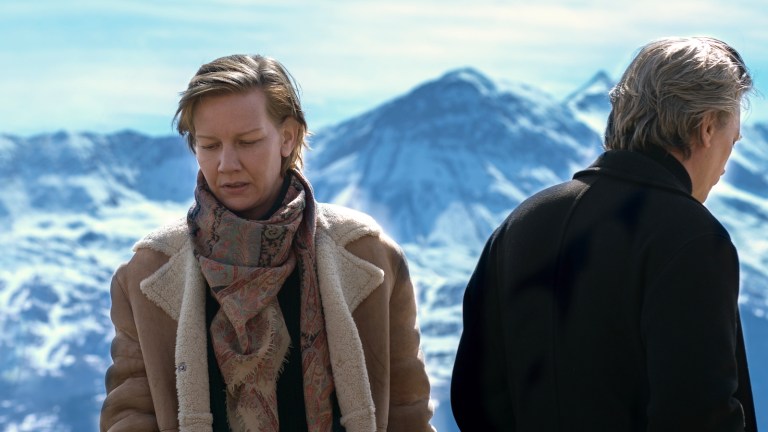An Anatomy of a Fall Theory That Changes the Meaning of the Ending
We examine the hidden twist and meaning of the Oscar Best Picture contender, Anatomy of a Fall.

This article contains major Anatomy of a Fall spoilers.
Justine Triet’s new film, which just picked up nominations for Best Picture, Adapted Screenplay, and Director at the Oscars, as well as the Palme d’Or at Cannes last year, is a courtroom drama following a woman accused of killing her husband. The man in question was found dead after falling out of the window of their remote cabin. There were no witnesses. She says she didn’t do it. Did he fall? Did he jump? Or is she guilty? That’s for the court to decide in this fascinating character study that feels intense and real, and challenges the audience to do the work along with the jury.
The beauty of Anatomy of a Fall is that by the end we, the audience, don’t know conclusively whether Sandra (Sandra Hüller – who is nominated for the Best Actress Oscar) killed Samuel (Samuel Theis) or not. Triet wouldn’t tell Huller on set whether she thought Sandra was guilty or innocent either. The film is as much about the court system, how women are treated, and the complexities of adult relationships.
There’s a third key character in the mix, too, and that’s Sandra and Samuel’s blind son Daniel (Milo Machado Graner). He’s not home at the time of the fall but he finds his father underneath the window and thus becomes a key witness. This creates an additional tension when Daniel is barred from conversing alone with his mother while the trial goes on—the prosecution fears her influencing his testimony in any way. The film is set in France, but Sandra is German, yet Sandra is only permitted to speak in French to her son and to the jury during the trial.
The jury (and perhaps the audience) flips between believing Sandra and being more skeptical as evidence is introduced that the head injury that killed Samuel occurred before he hit the ground, that Sandra and Samuel had a physical fight the night before he died, that he was deliberately tormenting her with his music on the day of his death, that he’d accused her of plagiarizing him, that she had been unfaithful in the past, that he had possibly attempted suicide on a previous occasion, and that a subplot in one of her books involved a woman contemplating killing her husband.
The main possibilities the movie poses are that:
1. He fell. Sandra says she thinks this is what happened, but the height of the window ledge, the trajectory of the fall, and the lack of blood splatter on the shed roof suggests that this might not have been the case. The lawyer Sandra is friendly with thinks the jury wouldn’t believe this anyway (the lack of blood on the roof, though, could have been due to the snow on that section melting, we later see).
2. She killed him. She’s annoyed with him, he’s accused her of a bunch of things, she’s unhappy in France, they had a fight, maybe it was an accident in the heat of the moment.
3. He killed himself and tried to set Sandra up for his murder. In the recording where the two argue, Samuel very much provokes that fight. She tries to talk him down repeatedly while he brings up things from their relationship which occurred years previously but are the clear flags for what her motive would be. She tells him she loves him. But he deliberately pushes her until she reacts physically. She says she threw a glass at the wall and slapped his face, and he grabbed her wrist (leaving bruises). She then explains further sounds of violence and bruising on his body were him hitting himself. We don’t know if this is true, but if it is, a reasonable assumption could be that he’s trying to set her up.
4. He killed himself, simply because he was unhappy and with no additional motive. We know he had been taking antidepressants in the past, had taken an aspirin overdose once before (verified by Daniel who gives poor old Snoop aspirin again before he testifies, to recreate the way the dog was behaving after the time Samuel took the overdose and Snoop had eaten some of his vomit). And Samuel had a very strange conversation with Daniel in the car talking about how “Snoop” won’t be around forever. Or did he…
Anatomy of a Fall is an extremely nuanced movie, and the last thing it’s about is whether Sandra killed Samuel, despite what the plot line might suggest. One of the things it is about though is how we make big decisions.
Daniel is torn up about his testimony having heard the recording of his parents fighting so viciously. He asks for some time away from his mother with just his minder Marge (Jehnny Beth) before he goes to testify and during that time he talks to Marge about how to know what is true. You can’t always know, Marge tells him, you just have to decide what’s true for you. It’s probably the most important line in the film.
Daniel testifies about the experiment he did with Snoop, backing up his mother’s claim that his father had suicidal thoughts. He tells the jury he can’t imagine his mother killing his father but he could imagine his father taking his own life. And then the judge asks him if he is finished. After a short hesitation, Daniel says “no.”
It’s then that he relates the story of his conversation with his dad on the way to the vet with Snoop. His dad, according to Daniel, talked about how Snoop wouldn’t be around forever and that it would be sad but that Daniel would be OK, etc. It’s clear Daniel thinks he was talking about himself and preparing Daniel for the day that he, Samuel, would no longer be around.
It’s a powerful speech and it’s instrumental in Sandra’s acquittal. She’s freed and returns home—she and Daniel say they were both nervous about seeing each other. Then Sandra curls up with Snoop.
But did Samuel’s conversation with Daniel really happen?
In general the rules of Anatomy of a Fall are that if you see something happen, and it’s provable, then it did. So the loud music was witnessed by the journalist. Daniel taking the dog out for a walk was also witnessed by the journalist and his return—or the moment just after—was witnessed by Sandra. The fight is recorded so we are allowed to see the conversation but not the entirety of the fight. Daniel drugging Snoop with the aspirin before his testimony definitely happened, because Marge witnesses that, and therefore his motive for doing so is also true. He thinks Snoops has eaten some of Samuel’s aspirin-filled vomit after his suicide attempt.
However, the conversation between Daniel and his dad on the way to the vet had no witnesses. His father is of course dead, and Snoop is a dog. Yet we get to watch this scene recreated with Daniel’s narration. So did that conversation actually happen? That’s for each person to decide, but for our money: no. Daniel has decided that he’s going to believe that his mother is innocent. He tells the true story of drugging the dog, but the prosecution argue this doesn’t actually prove anything at all (which it kind of doesn’t).
Daniel’s hesitation before he tells the second half of his story suggests he’s making a decision here—to tell a story that could be true, is impossible to prove but which carries a great deal of emotional weight. Because in a case where the audience, and the jury, can’t actually know what the truth is, we have to make a decision in some way. And sometimes that’s with our hearts.
Did Sandra kill Samuel? For our money, we don’t believe so. She doesn’t have enough to gain, she keeps her cool for a long time during the fight the two have, and we don’t think she’d subject Daniel to that, especially not knowing exactly when he and Snoop would be home from their walk. But who knows? Do you think she did it? Let us know in the comments.
Anatomy of a Fall is available to watch on Amazon Prime Video.
